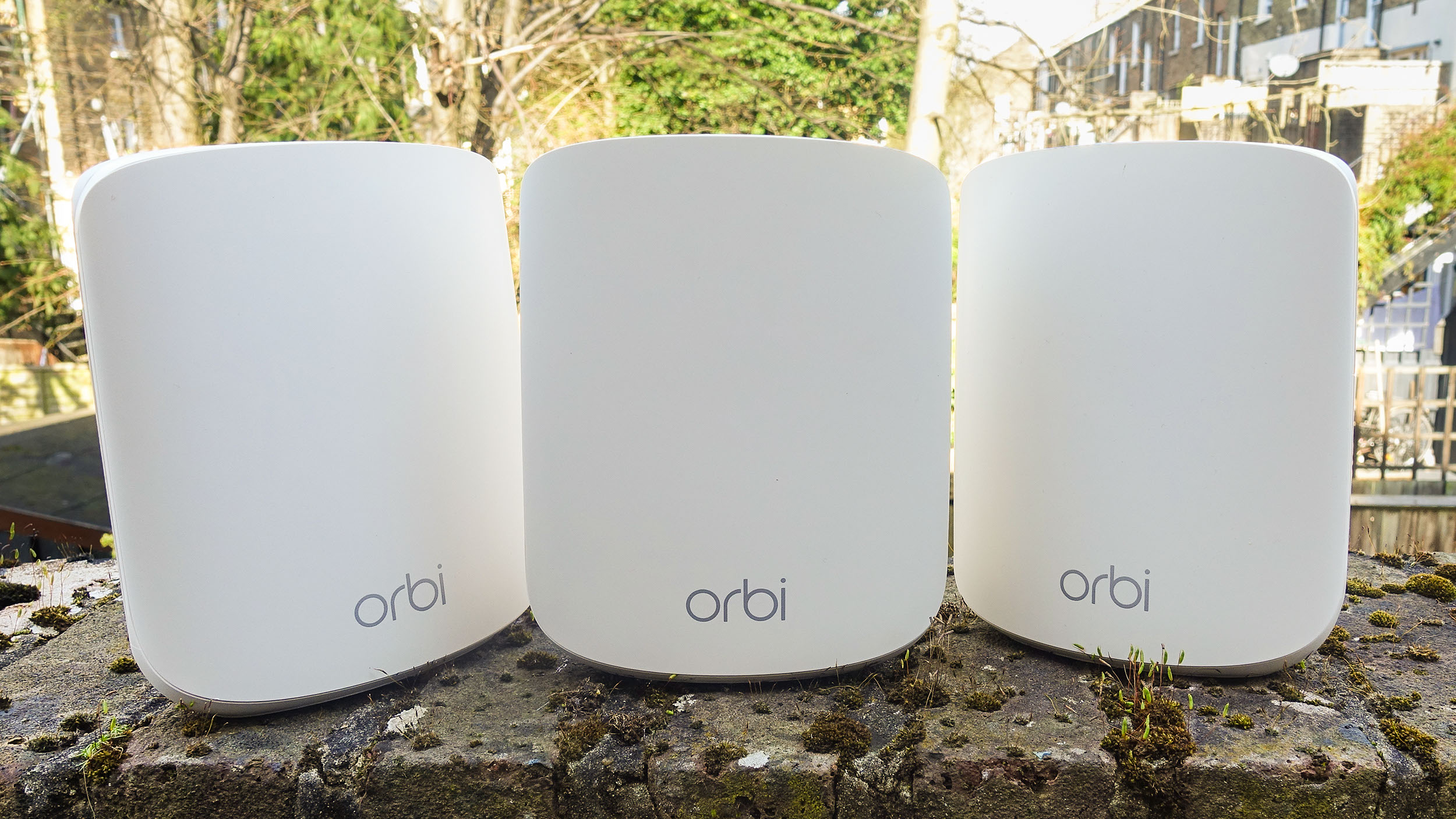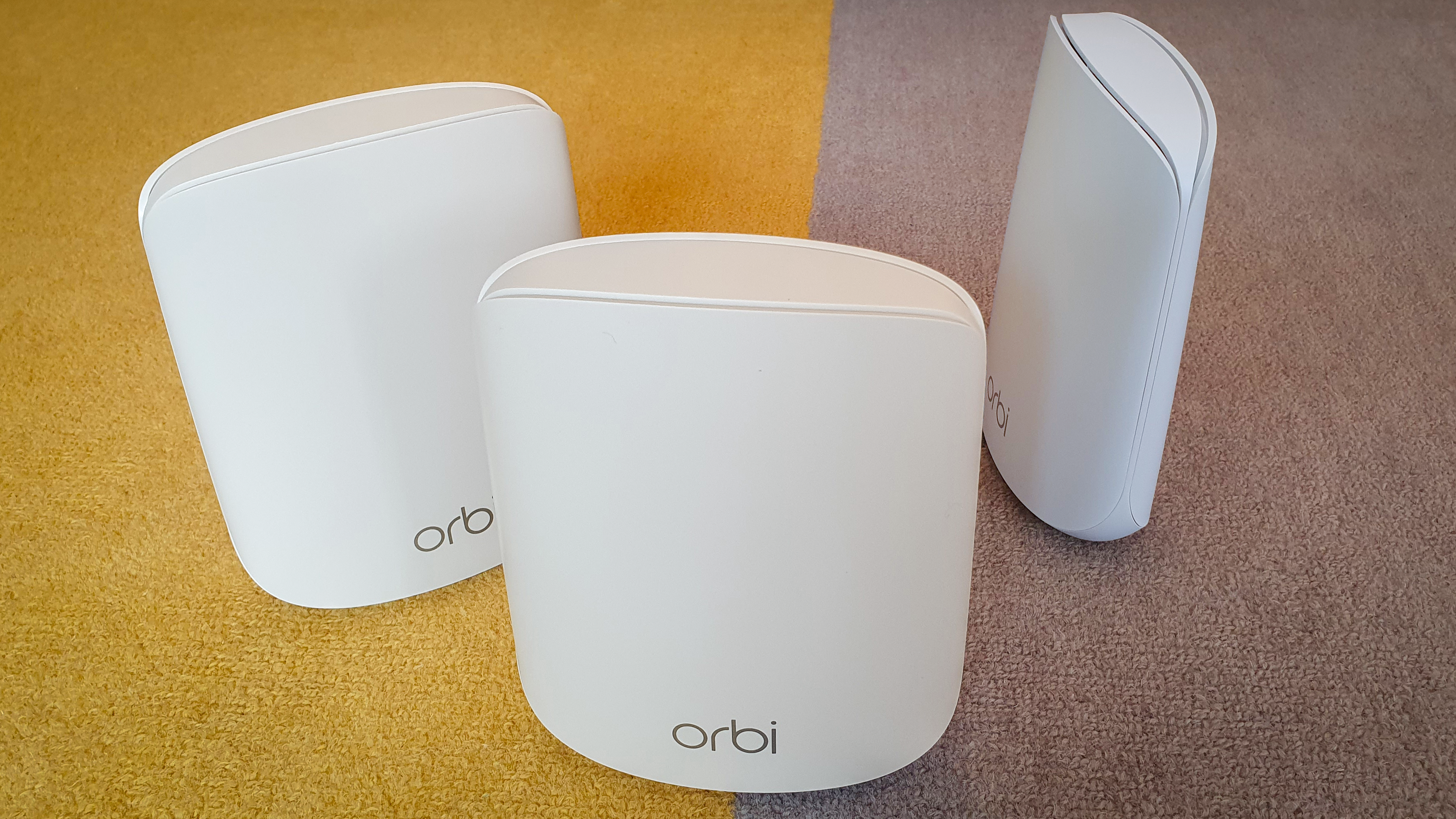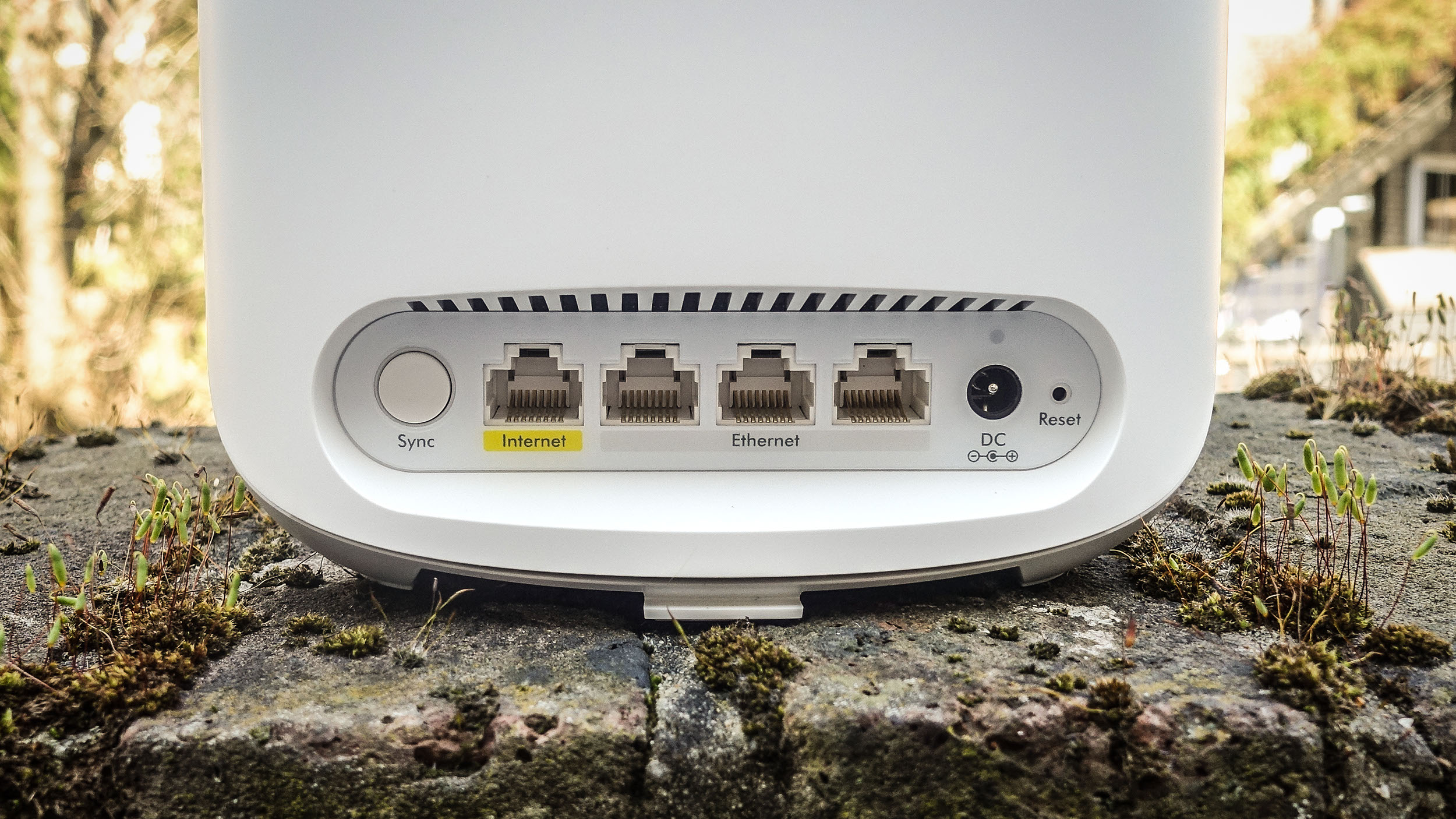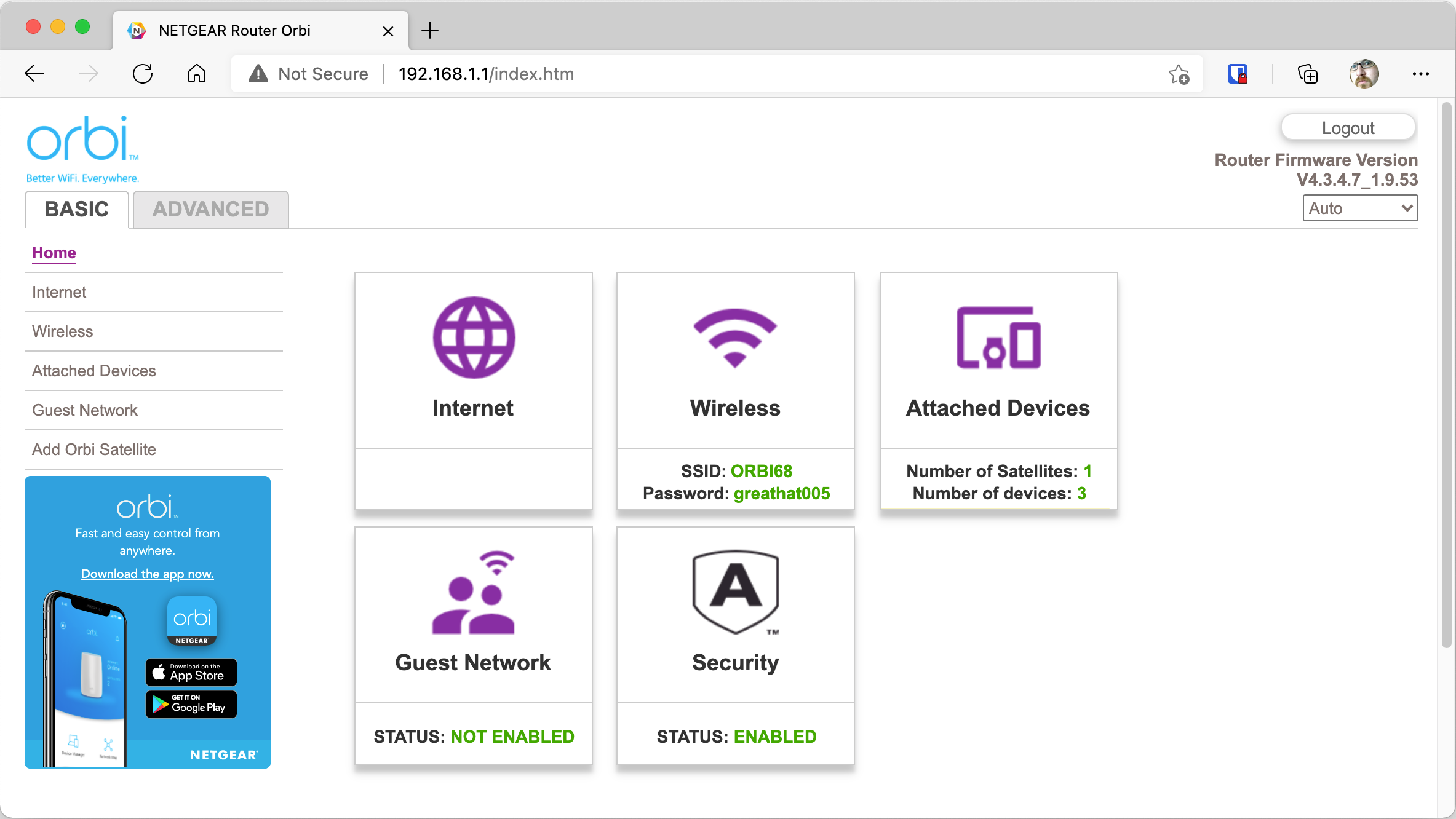Netgear Orbi RBK352 review: Plagued by compromise
A reasonably priced Wi-Fi 6 mesh system that delivers a strong signal, but make sure its cutbacks won’t annoy

-
+
Affordable
-
+
Solid speeds
-
+
Inbound VPN
-
-
Dual-band only

The Orbi RBK352 is Netgear’s new, low-cost Wi-Fi 6 mesh system. At least, it’s low cost compared to the company’s previous Wi-Fi 6 mesh offerings. The high-end Orbi RBK852 system is £645 for a two-node kit, while the mid-range RBK752 will set you back £450. The RBK352, by contrast, starts at £195, making it a viable competitor to many Wi-Fi 5 mesh systems.
Inevitably, though, the price cut comes with a trade-off. The RBK352 hardware isn’t as powerful as its premium brethren, and that has an impact on real-world performance. In particular, it’s a dual-band system. Each unit contains a 2.4GHz radio rated at 600Mbits/sec and a 5GHz radio with a theoretical maximum transfer rate of 1,200Mbits/sec. That’s a decent chunk of bandwidth but, since there’s no third radio, this has to be shared between client and backhaul traffic.
As with all Wi-Fi 6 gear, the RBK352 is backward-compatible with Wi-Fi 5 (802.11ac) clients, but it won’t interoperate with Wi-Fi 5 Orbi units. It’s technically possible to mix and match RBK352 nodes with satellites from an RBK752 or RBK852 kit, but the performance limitations of the RBK352 will still apply to the client devices connected to it.
Netgear Orbi RBK352 review: Design
The Orbi RBK352 is designed to completely replace your existing router, although if your internet connection requires you to keep your ISP router in place you can still use the Orbi in access point (AP) mode, or in a double-NAT configuration.
With a curved, off-white design, the RBK352 units are unmistakably of the Orbi clan. They’re the babies of the family, though, standing only 178mm tall with a footprint of 145 x 61mm. We don’t mind this at all because it means that you can situate them inconspicuously wherever you like, which can’t be said of the looming RBK852 units.

We’re also pleased to see that wired connectivity hasn’t been cut down too far. Orbi systems never support USB, but the primary unit has three Gigabit Ethernet sockets next to the WAN connector, with each satellite sporting a further two. That’s a definite advantage over the similarly priced TP-Link Deco X20, whose main router unit only has a single Ethernet port spare once you’ve hooked up the other one to your internet connection.
We miss the big, obvious status lights of other Orbi designs, though. The RBK352’s discreet LED means it’s far less obvious when a node is booting up or in an error state.
Netgear Orbi RBK352 review: Ports and features
We used the Android app to set up the RBK352 system, and found it almost foolproof. There’s a clunky moment when you have to jump into your phone’s Wi-Fi settings to manually connect to the Orbi network, then find your way back into the Orbi app to continue the setup process – but there’s not much Netgear can do about that. At any rate, it’s a process you’ll probably only go through once.
From then on you can use either the smartphone app or the web portal to manage your mesh. It’s a clear and responsive app with a familiar set of features from previous Orbi devices, including Netgear’s distinctive inbound VPN service; this makes it easy to access your home servers and clients over the internet. As usual, integration with Alexa and the Google Assistant allows you to control the guest network and reboot the router with your voice and you can enable Netgear’s Armor network security module too, which adds vulnerability scans and malicious site blocking. The $70-per-year subscription is steep given TP-Link’s equivalent HomeCare service is free, but Netgear’s offering includes Bitdefender Security software for all the clients in your household.
There are a few key omissions. No USB sockets means no file or printer sharing and, as usual with Orbi systems, there’s no band-splitting option, meaning your 2.4GHz and 5GHz networks appear under a single combined SSID.

For some reason, Netgear also doesn’t currently offer its Circle parental controls on Wi-Fi 6 mesh systems. These could be added in a future firmware update, but for the time being you’ll have to make do with the (quite sophisticated) website-filtering feature, which lets you block specific keywords and domain names for specific clients according to a custom schedule. You can’t filter sites by category, however, as you can on the TP-Link Deco X20.
Netgear Orbi RBK352 review: Performance
Only having a single radio 5GHz is normally bad news for a mesh system. However, the RBK352’s rating of 1,200Mbits/sec is theoretically fast enough to download a full gigabyte of data in under seven seconds. So it all comes down to real-world performance.
We tested this in a residential premises, with the primary Orbi unit located at the front of the house. The secondary node was placed at the opposite end of the adjacent room, while the third was positioned in the room below. We then carried a 2020 HP Elite Dragonfly laptop, equipped with an internal Wi-Fi 6 network card, to various rooms of the building and measured upload and download speeds to a NAS appliance connected to the primary Orbi RBK352 node via Gigabit Ethernet.
Even with the benefit of an additional satellite, the dual-band RBK352 couldn’t keep up with the tri-band Orbi systems. It isn’t as fast as the Asus ZenWiFi AX, either; while the Netgear system was faster in the rooms closest to the primary router, the Asus’ performance held up better as we moved further away, which is, of course, the whole point of a mesh.
Within its own price category, however, the RBK352 holds up well. It dropped a smidge behind the TP-Link Deco X20 in the living room, but proved notably quicker in the adjacent room. Everywhere in the building, the test laptop switched seamlessly between nodes to keep the connection fast and stable, and with download speeds never falling below 20MB/sec, we see no reason to complain.

These performance figures do come with a few caveats, however. If you have clients dotted around the building that are all exchanging data over the Orbi network, it might mean that a lot of backhaul data has to be passed back and forth between nodes, which will reduce the amount of bandwidth available for your streams and downloads.
Things get worse if you’re still using Wi-Fi 5 clients. The last-gen standard quickly gets bogged down when multiple clients want to talk at once, causing performance to drop off further. This affects all Wi-Fi 5 routers and meshes, but the RBK352 with its dual-band design is likely to suffer particularly acutely.
Netgear Orbi RBK352 review: Verdict
The Orbi RBK352 does what it promises. The units are unobtrusive but offer decent connectivity, and the software is as good as you’ll get from any Orbi system. Compared with Netgear’s previous forays into the Wi-Fi 6 mesh market, the price is tempting, too.
However, if you’re being drawn in by the RBK352’s comparatively low price, it’s worth exploring whether an even cheaper solution will do what you need: we found that the Honor Router 3 served up at least 16MB/sec all around our three-bedroom, two-storey premises for only £67. Conversely, if you’re keen to enjoy the full performance of Wi-Fi 6 then this budget-conscious system won’t get you all the way there.
Even within the very narrow arena of affordable dual-band Wi-Fi 6 mesh systems, the RBK352 isn’t the only candidate to consider. The TP-Link Deco X20 is short on network ports, and has no equivalent to the Orbi’s VPN server, but it does come with proper parental controls, and the free network security module is a significant bonus.
Ultimately, the decision must come down to your personal priorities and budget. However, while we can’t say the RBK352 is right for everyone, we can tell you that what you see is what you get – that being a likeable and user-friendly mesh system. If that inspires you to get your wallet out, you won’t be disappointed.
Netgear Orbi RBK352 specifications
| Band support | Dual-band 2.4GHz/5GHz Wi-Fi 6 router |
| Radios | 2x2 MU-MIMO internal antennas |
| Ports | 3 x Gigabit Ethernet, Gigabit WAN port |
| Dimensions (WDH) | 145 x 61 x 178mm |
| Weight | 660g |
Satellite specifications
| Radios | 2x2 MU-MIMO internal antennas |
| Ports | 2 x Gigabit Ethernet |
| Dimensions (WDH) | 145 x 61 x 178mm |
| Weight | 530g |
Get the ITPro daily newsletter
Sign up today and you will receive a free copy of our Future Focus 2025 report - the leading guidance on AI, cybersecurity and other IT challenges as per 700+ senior executives
Darien began his IT career in the 1990s as a systems engineer, later becoming an IT project manager. His formative experiences included upgrading a major multinational from token-ring networking to Ethernet, and migrating a travelling sales force from Windows 3.1 to Windows 95.
He subsequently spent some years acting as a one-man IT department for a small publishing company, before moving into journalism himself. He is now a regular contributor to IT Pro, specialising in networking and security, and serves as associate editor of PC Pro magazine with particular responsibility for business reviews and features.
You can email Darien at darien@pcpro.co.uk, or follow him on Twitter at @dariengs.
-
 ‘Phishing kits are a force multiplier': Cheap cyber crime kits can be bought on the dark web for less than $25 – and experts warn it’s lowering the barrier of entry for amateur hackers
‘Phishing kits are a force multiplier': Cheap cyber crime kits can be bought on the dark web for less than $25 – and experts warn it’s lowering the barrier of entry for amateur hackersNews Research from NordVPN shows phishing kits are now widely available on the dark web and via messaging apps like Telegram, and are often selling for less than $25.
By Emma Woollacott Published
-
 Redis unveils new tools for developers working on AI applications
Redis unveils new tools for developers working on AI applicationsNews Redis has announced new tools aimed at making it easier for AI developers to build applications and optimize large language model (LLM) outputs.
By Ross Kelly Published
-
 Google layoffs continue with "hundreds" cut from Chrome, Android, and Pixel teams
Google layoffs continue with "hundreds" cut from Chrome, Android, and Pixel teamsNews The tech giant's efficiency drive enters a third year with devices teams the latest target
By Bobby Hellard Published